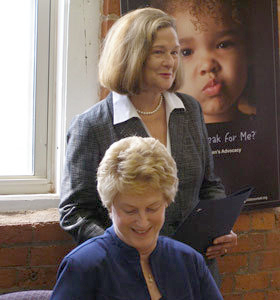
Rep. Patricia Dillon, D-New Haven and
Gov. M. Jodi Rell
Christine Stuart photo

June 29, 2009
GOVERNOR SIGNS 'MADOFF' BILL
by Christine Stuart, CT News Junkie

While financier Bernard Madoff was being sentenced to 150 years in prison for swindling investors Monday, Connecticut's Gov. M. Jodi Rell was signing a bill, which will allow the state to go after white collar criminals and recoup at least a portion of a victim's losses.
In the Hartford office of the Center for Children's Advocacy—one of Madoff's many victims—Rell signed the legislation as Rep. Patricia Dillon, D-New Haven, the bill's main proponent, looked over her shoulder.
The bill allows the state to seize the assets of those convicted of swindling people, Dillon said. She said the federal government usually has a bigger role in securities fraud prosecutions, but in the case of Madoff, "they were asleep at the wheel."
"It's clear that they dropped the ball" Dillon said referring to the fact that Madoff was able to time his own arrest. "Who knows what he did before he did that?"
"We need to have vigilance on the state level, if only to protect our own people," Dillon said. "We can't rely on the federal government, if they're going to keep dropping the ball."
Under Connecticut law, if a john is convicted of soliciting a prostitute their car can be seized, Dillon said. She said court's already do restitution and this legislation is no different. She said it expands the power of the Chief State's Attorney to seize the assets of those that perpetrate fraud on others.
"This law will help ensure the criminal does pay," Rell said Monday during the bill signing ceremony.
"What happened to the people who believed in Bernie Madoff should serve as a sobering warning that the criminal element exists everywhere," Rell said. "White collar criminals are as slick as the schemes they peddle and will be dealt with severely in the State of Connecticut."
Another section bill asks the Banking Commissioner, Attorney General, and Chief State's Attorney to conduct a study and report to the General Assembly by March 2010 about the establishment of a fund to help repay victims of these fraud schemes.

However, there's nothing in the new law that will help the Center for Children's Advocacy recoup the $85,000 it lost when the JEHT Foundation closed its doors.
Brett Dignam, president of the Center for Children's Advocacy board, said its was only a few days after the Madoff scandal broke that the center was notified "our second biggest funder, JEHT Foundation, without warning or notice, was immediately closing its doors."
She said the foundation, one of only two national foundation's devoted to juvenile justice issues, closed its doors because the foundation funds were invested with Madoff.
"This loss came at the worst possible time," Dignam said. "A time when other sources of funding were difficult to identify."
"This loss caused the loss of staff, givebacks, and furloughs, but most importantly cutbacks in the services to the children we represent—the most vulnerable among us, those who so desperately need its voice," she added.
Martha Stone, executive director of the Center for Children's Advocacy, said the center and other juvenile justice organizations across the nation were "devastated by the precipitous closing of the JEHT Foundation." She said while the center has worked to bring in additional funds, it has yet to make up the JEHT Foundation funding.